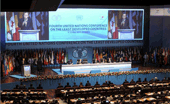LDCs: Istanbul Plan of Action “has no teeth”
Published on Fri, 2011-05-13 07:43
Sources: Inside reporting - IPS The LDC Civil Society Forum Istanbul Declaration The Fourth UN Conference on the Least Developed Countries (LDC-IV) finished this week in Istanbul with the approval of a plan of action that “has no teeth and appears to have left the people living in the LDCs in a worse position than before”, said Arjun Karki, international coordinator of LDC Watch and spokesperson of the Civil Society Forum of the meeting. Karki said in a press conference on Thursday that the civil society representatives in the conference "are appalled and disillusioned", because “it’s difficult to find” in the Plan of Action “real commitments and quantifiable targets that would help the lives of people in the LDCs. The text is “devoid” of “specific commitments”, “mechanisms to hold governments to account” and “political will,” the activist added. The rich countries "have got away without committing themselves to delivering long-standing commitments to provide support for LDCs and remove obstacles to development,” Karki warned. “Our vision, hopes and expectations for the conference were very high but the results the governments have produced have made a mockery of these," he regretted. When the negotiations about the Programme of Action ended on Wednesday, the anger and disappointment was clear among the civil society representatives present in Istanbul. The document not only doesn’t meet their high expectations, they said: it doesn’t even meet the UN General Assembly mandate approved when it convened the Conference. The UN General Assembly asked the Conference to provide additional support to the 48 countries officially listed as LCDs and to create a new partnership to ensure that they can "graduate" out of that group. None of these objectives was met, said the activists. Civil society organizations had been critical of the implementation of the previous Programme of Action, approved in Brussels, and pointed to shortcomings of the current aid architecture and market-driven model of development promoted by dominant players in the international community, they added. Their prime message is that the development paradigm must be changed. Civil society organizations stressed the need to move away from market-driven policies and further implement people-centered development policies that require governments to ensure sustainable livelihoods and uphold human rights and gender equality. Roberto Bissio, from Social Watch, pointed out to statistics showing that even when the economy grew in most LDCs during the first decade of the century, social indicators progressed slower than in previous periods. “Growth has only benefitted small elites and foreign investors, mainly extractive industries” he said. Global civil society called for more and better official development assistance (ODA), which must be directed towards development effectiveness rather than the dominant aid effectiveness approach. ODA must respect sovereignty and support people-owned policies and programmes, rather than being undermined by conditionality, they said. The civil society representatives have also demanded preferential treatment for LDCs to ensure fair trade and debt cancellation and real and substantive increases in ODA, guaranteeing their effective and sustainable development. Throughout the process, civil society organisations have called for lessons to be learned from the failings in the design and implementation of the Brussels Programme of Action. In Istanbul, they showed their deeply disappointment with the outcomes of the UNLDC-IV. Looking at its final results, they showed their frustration because the governments did not lived up the commitment they took on when they voted in the General Assembly the Resolution A/RES/63/227: “To mobilize additional international support measures and action in favour of the LDCs and, in this regard, to formulate and adopt a renewed partnership between the least developed countries and their development partners”. IPS reports that the Programme of Action approved in Istanbul for the decade 2011-2020 declares that the ownership and primary responsibility for development lies with the least developed countries themselves. LDCs were called on to incorporate the Programme of Action into their national development strategies, plans and programmes and identifying the domestic authorities responsible for overseeing implementation and multi- stakeholder engagement by parliamentarians and the private sector, sais the agency story. Their development partners have pledged to a renewed and strengthened global partnership that must include “the United Nations system, […] the Bretton Woods institutions, other multilateral institutions and regional development banks, within their respective mandates," the declaration reads. The conference did not mobilise finances for climate change adaptation, warned Lidy Nacpil, international coordinator for Jubilee South – Asia/Pacific Movement on Debt and Development. According to IPS report, the text lacks of new pledges to improve the level of official development assistance from the Rich World to the poorest countries of the South, according to Thida Khus, the executive director of Silaka, a Cambodian NGO promoting gender equality, who deems the conference a failure. This document is even worse than the Brussels Plan of Action, she said. "The failure of LDC-IV should mostly be blamed on the developed world for failing to commit additional finances for the LDCs," she said. "The governments in LDCs should also bear the blame for failing to lobby for their people." |




